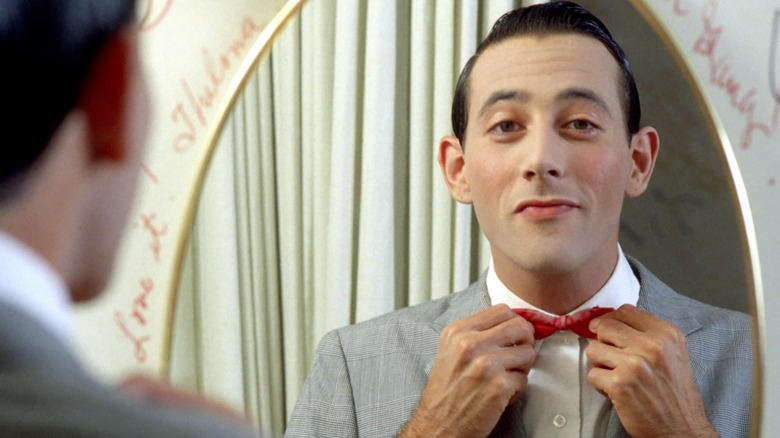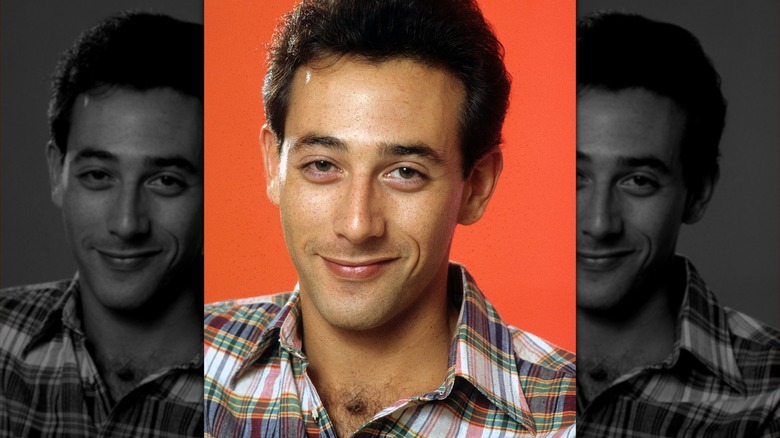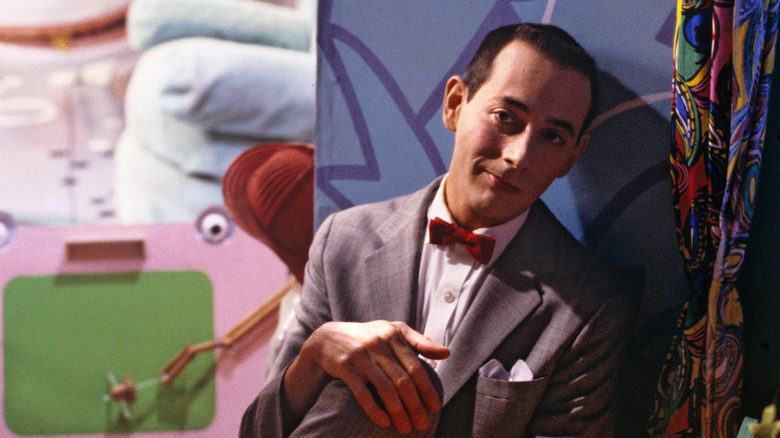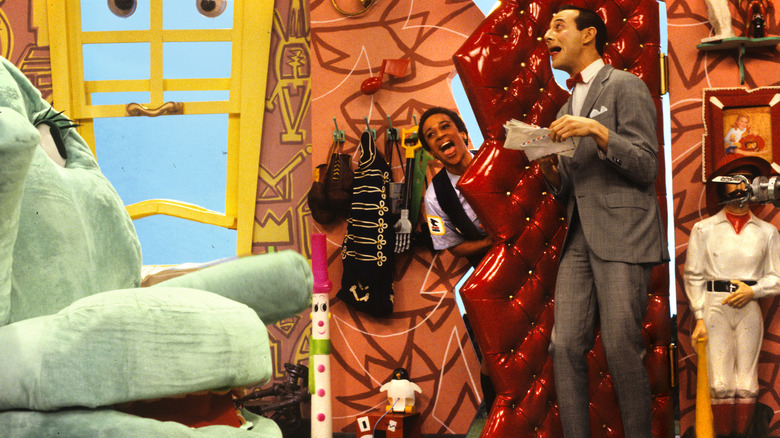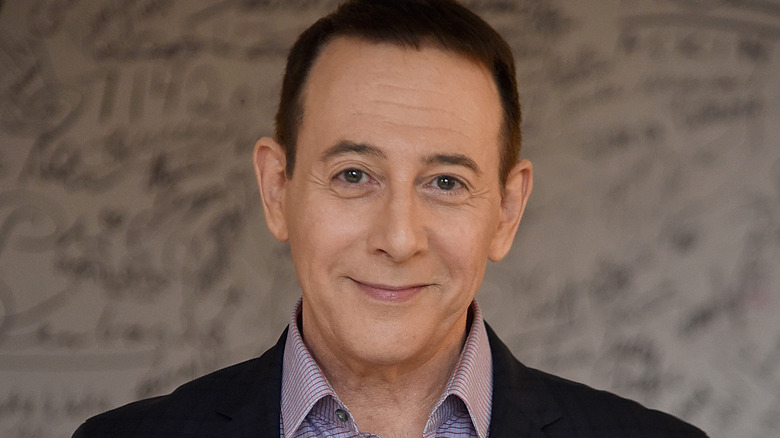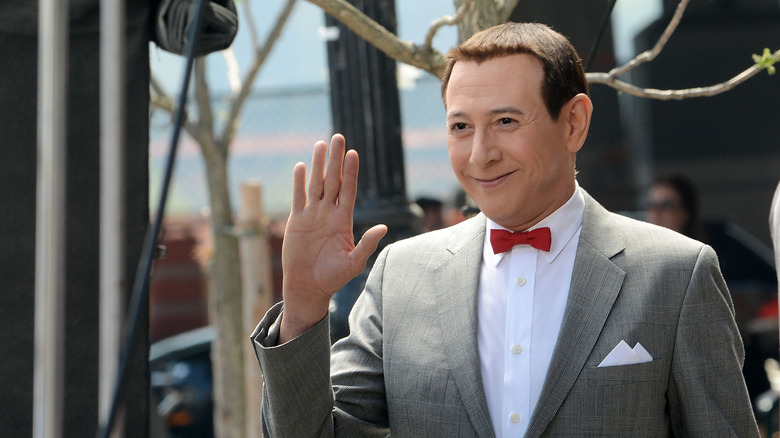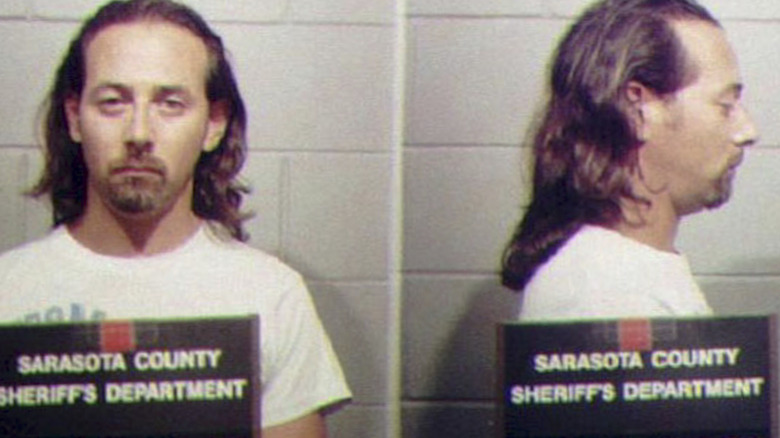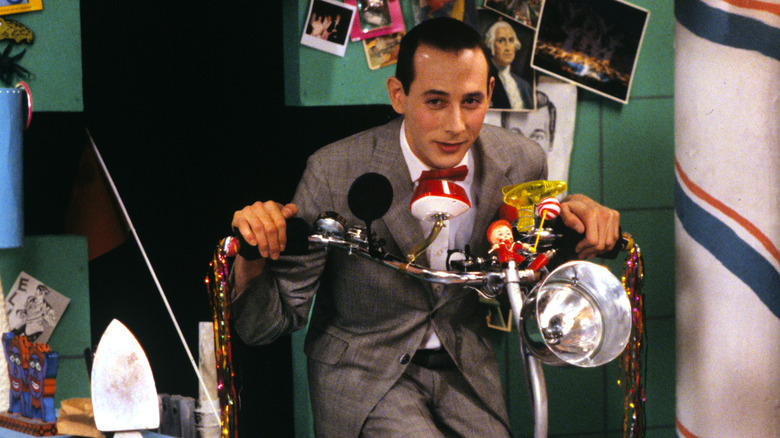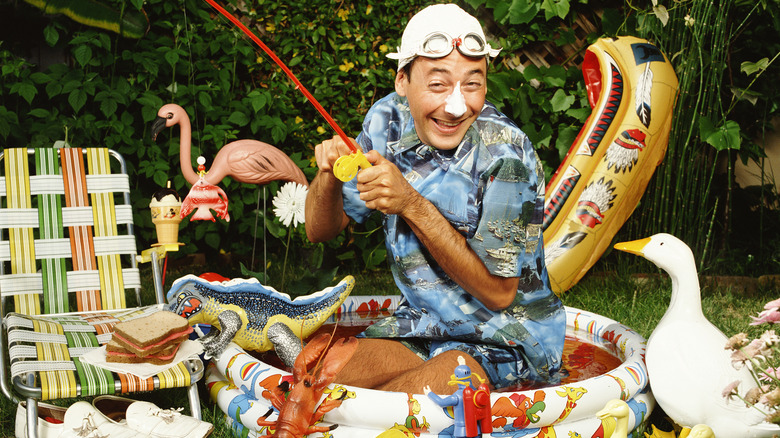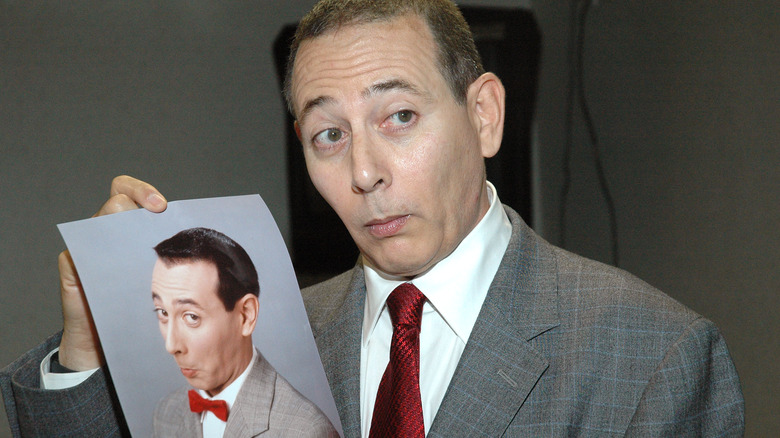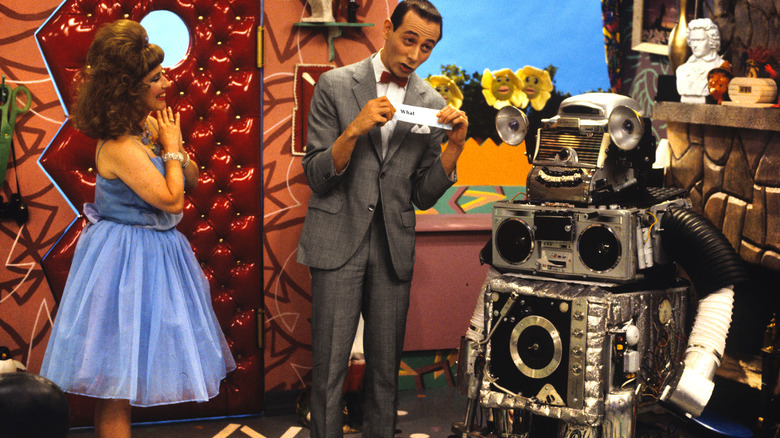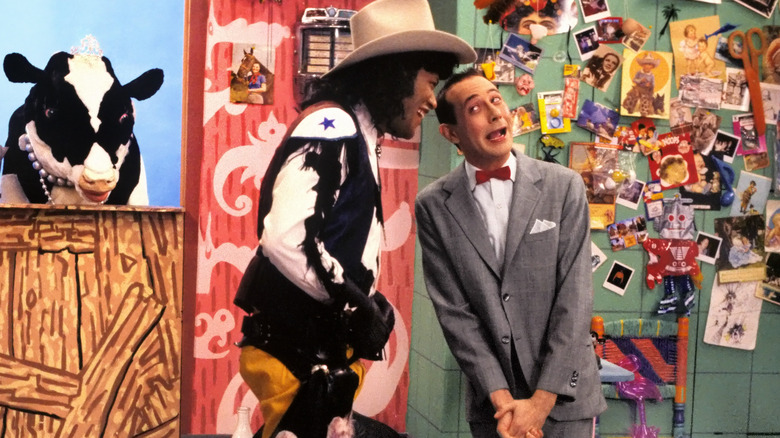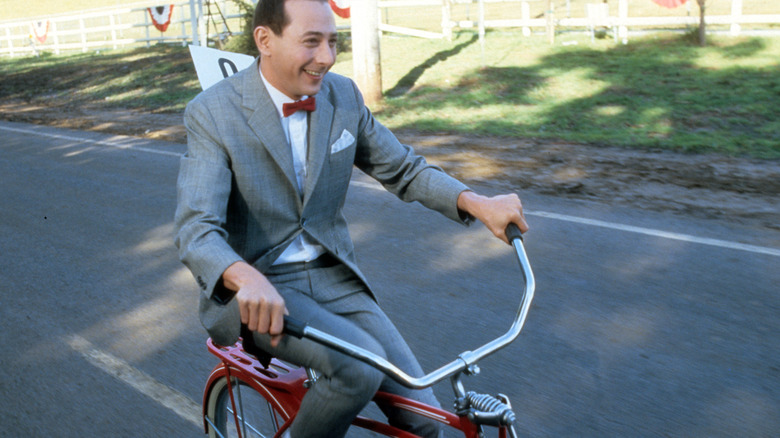The Untold Truth Of Paul Reubens
Even though no one had really heard too much from Paul Reubens — or his alter ego, Pee-wee Herman — in quite some time, his 2023 passing was still a shock. He bid farewell with a final, heartbreaking message, posted to his Instagram: "Please accept my apology for not going public with what I've been facing the last six years. I have always felt a huge amount of love and respect from my friends, fans, and supporters. I have loved you all so much and enjoyed making art for you."
Reubens has been a surprisingly enigmatic figure, even at the height of his career. He's said that on a personal level, that was precisely the way he liked it. Notoriously private when it came to matters involving his personal life, he once explained to The New York Times, "For survival, it's much easier not to stick out."
That's a pretty heartbreaking take on fame, but not one that's entirely surprising. Reubens is, after all, equally well-known for his career-shattering arrest in an X-rated Florida theater, and whether or not his popular childlike, surreal persona made it easier for him to become a pop culture punchline is an intriguing — albeit unanswerable — question. Like many high-profile stars, there was much, much more to Reubens than meets the eye, so let's talk about some of the fascinating stories behind the bow tie.
He thought his dad was exaggerating stories about his life. He wasn't
It's easy to forget that all parents had lives of their own before they became "Mom" and "Dad," and according to what Paul Reubens shared in a documentary called "Above and Beyond," he had never been entirely certain that his father hadn't been making up stories about his youthful exploits. It wasn't until he got older — and his father started to be written about in books — that he realized it was all completely true, and it was pretty incredible stuff.
Milton Rubenfeld — raised an Orthodox Jew — flew for the U.S. Air Force during World War II, and after the war, Israel started to establish itself as an independent nation. It was an uphill battle, though, and they needed fighters and pilots who were willing to risk it all. Rubenfeld was living in New York when he was approached by the young state and asked to help establish their military. He first agreed, then recruited four of his friends to the cause, too. Those five pilots went back and forth, smuggling in not only aircraft but Jewish women, too, under the protection of mock marriages.
"They didn't think about all the other things, what they were leaving behind, or what they were risking," Reubens later said (via EW). "I think he was very proud of what he did."
Pee-wee's inspiration? Just Jeff.
Paul Reubens found his footing as a performer while a member of the improv troupe The Groundlings, and one of the things that made him stand out from the rest of the illustrious crew was his ability to create characters... although not all have stood the test of time. (Among them was a Native American chief — complete with full headdress — that Reubens called Joe Longtoe.)
Pee-wee, though, did stand the test of time — although his birth wasn't an easy one. In "Inside Pee-wee's Playhouse: The Untold, Unauthorized, and Unpredictable Story of a Pop Phenomenon," author Caseen Gaines revealed that Pee-wee was created with a little inspiration from an aspiring comic who was a regular fixture at The Comedy Store. The Groundlings' artistic director, Gary Austin, told Reubens about meeting the teen, who gave his name as "Just Jeff," and had a routine where he'd crack jokes about items he pulled out of a bag.
Unfortunately for him — and everyone in the audience — he was really bad at it. After Austin pitched him as the basis for a character, Reubens added a now-distinctive voice and reimagined the idea of using props. The finishing touch — a suit that didn't quite fit — was also Austin's ,and the character was perfected on stage over the course of the next year. The rest is history.
Was Pee-wee's playhouse theme really all his idea? That's debated
There's an oft-told tale about just how the inarguably bizarre concept of "The Pee-wee Herman Show" was developed, and as Paul Reubens usually told it, it had been his idea, hatched on a flight from New York to California. He always credited his parents with giving him the money he needed to put the whole thing together, but according to what others revealed in Caseen Gaines's "Inside Pee-wee's Playhouse," that might not be entirely true.
Another version of the story comes from a television producer named Dawna Kaufmann. At the time Paul Reubens was creating his characters and finding his voice with The Groundlings, Kaufmann was producing an "SNL"-style competitor, and looking for the next great idea. "If you want to be edgy, you've got to be a little clever. So, I thought it would be wise to come up with a late-night show that couldn't be touched by the censors ... We ... would be subversive," she explained. Pieces started to fall into place: an old-school, variety-show feel, plenty of innuendo, and "a playhouse idea."
When Kaufmann was introduced to Reubens, she said that she instantly knew that she had her host. As the show went on and ultimately wrapped, Kaufmann said that she was pushed so far out of it that she'd considered suing Reubens. By then, though, he was simply too big a star.
His favorite place in California? It's very Pee-wee-esque
In 2016, The New York Times got a face-to-face interview with Paul Reubens. The idea was that they were going to talk about his upcoming "Pee-wee's Big Holiday," but as part of the interview, journalist Jonah Weiner asked Reubens to meet in a place that was important to him on a personal level. The place he picked sort of makes one wonder where Reubens ends and Pee-wee begins.
They met at Walgreens' flagship store, and it's not the average Walgreens: It has, for starters, a sushi bar. For Reubens, it was heaven on earth and a little bit his dream home. He explained: "There are apartments upstairs — wouldn't it be amazing to live here? You'd never have to leave."
Following him around and through the store was a fascinating insight into his character. He was drawn to the "As Seen On TV" section of products, and he shared one of his must-have products — a packet of something called WoundSeal, which he revealed was one of his mother's go-to first aid products. They perused the liquor store, marveled over the ways to wear a poncho, and along the way, Reubens revealed a childhood quirk: When he wasn't playing with his toys, he'd make sure they were always left facing up.
For a long time, there was no Paul Reubens
Ahead of a 2007 interview, The New York Times observed that Paul Reubens rarely had sit-down conversations with anyone. That, it turns out, was done by design. Bob Plunkett is a columnist for Sarasota Magazine, and he's known Reuben's mother, Judy Rubenfeld, for a long time. But even with that family connection, Plunkett wrote that getting an interview with Reubens just wasn't the sort of thing that happened, as he and his manager decided that the only face that got publicity was that of Pee-wee Herman.
"No interviews with Paul were ever allowed, no photos of him were available, no allusions to him were permitted," Plunkett wrote. "The 'home-town-boy-makes-good' story I kept wanting to do was always squashed, and with what I considered a very heavy hand." He added that he wasn't just told 'no,' he was told that unless he dropped the matter entirely, they weren't going to allow any Pee-wee-related material to be published, either.
That actually had some bizarre consequences. Even though Pee-wee Herman took relatively little make-up and no disguise, his appearance was different enough that it meant Reubens spent most of his life going largely unrecognized. In fact, Deseret News says that one of the very first times that Reubens was connected to his alter ego in a very public way was with the publication of his notorious 1991 mugshot.
After he was arrested, an unlikely person helped bail him out
On July 26, 1991, Reubens was arrested for exposing himself while in an X-rated theater, and it very quickly turned into one of the biggest scandals of the year. Even though many supported him, the idea of the host of a children's television program being arrested on those charges was just not going to go away.
Reubens pretty much disappeared for a while, and in 2020 that he spoke about it in an interview with The Hollywood Reporter. He'd already officially quit "Pee-wee's Playhouse" when the scandal broke and said he didn't feel it destroyed him. "When people go, like, 'Was your career over in '90, '91?' I never viewed it like that. I make the rules of when I'm coming back and when I'm not coming back, and what I do next." A few years prior, though, he also told The New York Times that although he tried not to dwell on it, he did regret how he handled it: "If I had to do it over again, I would figure out a way to get out there, talk about it, take control of it."
Reubens did have a lot of support at the time, including from members of the police department who arrested him. When he needed to post bail, he was $40 short — and it was Cpl. Joan Verizzo who gave it to him. (She broke departmental policy to do it, and was suspended for a day.)
That wasn't his first arrest
A few months after Paul Reubens was arrested in a Sarasota adult theater, Rolling Stone did a deep dive analysis of the incident, why it happened, and what the consequences might be. (They also shared the fact that Reubens was far from the only person arrested at the theater, saying local officers often headed there on slow nights to see just who they could arrest.)
They also revealed that it wasn't the first or even the second time he'd been arrested. The first was in 1971, when he ran afoul of the same Sarasota police force and was arrested for marijuana possession. The offense earned him two years' probation.
There was another arrest, though, that could have been much more damaging. Pee-wee Herman was just starting to hit the stratosphere when Reubens was, again, visiting his parents in Sarasota. It was 1983, and he was arrested for "loitering and prowling" around what was then called the Adult Entertainment Center. The charges were ultimately dropped, but it could have derailed Pee-wee before he really got started: Sarasota Magazine columnist Bob Plunkett said that he recognized Reubens's name in the arrest record, but didn't out him as Pee-wee. In 1991, however, a reporter at the Sarasota Herald made the connection between Reubens and Pee-wee and ran with it.
He had planned on playing Pee-wee forever
Part of Pee-wee Herman's appeal is his sort of eternal, childlike surrealness, and when Paul Reubens decided to bring him back to the screen in 2016's "Pee-wee's Big Holiday," he was concerned he had aged out of the role. When he spoke with The New York Times, he said that he'd had a really hard time seeing himself on screen "...it's a buzzkill. I'm not as limber as I was, I'm not as skinny, I don't have that energy, I don't have that body," he told them, adding that when he had originally started pitching the movie to get someone on board, he'd suggested having Michael Cera step into Pee-wee's shoes.
That, of course, didn't happen, but what did happen was digital de-aging. In a conversation with The Hollywood Reporter, he said that he'd been so impressed that "I realized, I could do Pee-wee for 10 more years if I wanted to." He'd even had some ideas for future movies, and held out hope that the character's enduring popularity would result in more films.
By 2020, Reubens had apparently backed away from the idea of having anyone else play his famous alter ego. In an interview with Out Clique, they asked him if he was ever planning on passing on the bow tie, as it were, and he said absolutely not. Interestingly, he did have one person he'd consider: "I've always liked the work of Christopher Walken." And also, his dream role? Frankenstein's monster.
He's talked about how much Pee-wee took over his life
While Paul Reubens inhabited the character of Pee-wee Herman so completely that it might seem like it was the most natural thing in the world, Sarasota Magazine found out otherwise when they spoke to some of his longtime friends. Stephanie Moss explained, "He loved Pee-wee, but he wanted out." And he'd apparently wanted out for a good long time, describing his role as the titular character as learning him feeling trapped.
That's pretty heartbreaking stuff, and he explained to Out Clique that there were times when the line between actor and character got very blurry. "Sometimes it can be confusing having an alter-ego. For example, when I'm at the supermarket, am I shopping for myself or Pee-wee Herman? If I'm at the mall, and I see a nice pair of slacks, is it me or Pee-wee that's admiring them?"
In a conversation with The New York Times, Reubens was incredibly diplomatic about the idea that he wanted to branch out in his career and get away from Pee-wee. He told them that he simply didn't have time for projects other than Pee-wee-related ones and that he did appreciate the fact that shedding the Pee-wee look gave him anonymity rarely enjoyed by celebrities. Still, he observed: "You are constantly trying to figure out, how does one not become a slave to being somebody that someone else would recognize?"
He was serious about props and memorabilia... all of it
Being Pee-wee Herman may have seemed like a ton of fun, but for Paul Reubens, it was serious work. He oversaw everything that revolved around the character, so it's not entirely surprising that the iconic props of "Pee-wee's Playhouse" meant a lot to him. So much, in fact, that in his final days, he filed a lawsuit to try to get them back.
The story, reported Yahoo!, was that Reubens sued The Comisar Collection for keeping and then selling some props, including Mr. Window and Dog Chair. Reubens said that he had originally handed the props over with the understanding that the company was going to facilitate getting them into the Museum of Television, but when he found out that doesn't precisely exist (and that some of the items had been sold to private collectors), he tried — and failed — to get them back.
His legal team says that the missing props are worth somewhere in the neighborhood of $1 million, but those aren't the only ones that were important to Reubens. In an interview with The New York Times, he talked about how in between shooting, he always loved to go hit local thrift stores. Among his favorite finds? Knock-off and handmade Pee-wee Herman merch, which he always bought because he loved seeing just how much fans loved what he was doing.
What was he most proud of?
There's no denying that Pee-wee Herman shaped a lot of childhoods, but at the end of the day, what was Paul Reubens most proud of? The answer is kind of surprising, and he talked about it in an interview with The New York Times. It started, he said, with embracing attitudes outside of the mainstream and depicting people, relationships, and attitudes that weren't necessarily embraced anywhere else — starting with casting actors of color at a time when multi-racial casts weren't necessarily ordinary.
"The King of Cartoons was Black!" Reubens explained. "Not just anybody. The king! That came out of growing up in Florida under segregation. I felt really good about that."
While Reubens was making sure diversity featured heavily in the casting, on-screen, Pee-wee was making some major statements, too. He befriended characters that were originally terrifying, went on pretend dates with other male characters, and even married a fruit salad simply because he loved it. And that spoke to a lot of people, Reubens explained, saying that some of the most meaningful comments he got were from children who had felt like being unique was a bad thing ... until Pee-wee told them it wasn't bad at all. "I've had so much feedback from people saying, 'I was so confused as a kid, and your show helped.'"
If acting hasn't worked out, he had another career in mind
When Paul Reubens was growing up, he may have not known he was destined to be forever identified with a character created with a laugh, a handful of olde-timey catchphrases, and a slightly too-small suit, but he always knew that he was destined to be a performer. When he appeared on Conan O'Brien and was asked what he would have wanted to do if he didn't get into acting, he said that he'd had a completely different route as a performer all mapped out.
"This is going to sound like I'm joking, but this is really what I thought I would wind up doing," he began, going on to explain that his hometown of Sarasota was also where the Ringling Bros. circus spent the winter months. "I always thought I'd wind up in the circus," he said — and he had some serious circus skills that he learned at camp.
Reubens was actually a trapeze artist and tightrope walker, he revealed, going on to share a story about the time that his parents had come to see the kids put on a performance. He took to the balance beam, but it wasn't just a balance beam: "I had a ring, that had fire around it, I blindfolded myself and I'd skip through the ring," he said. His parents had been vaguely horrified, but, he said, "I think it was then, they knew."
